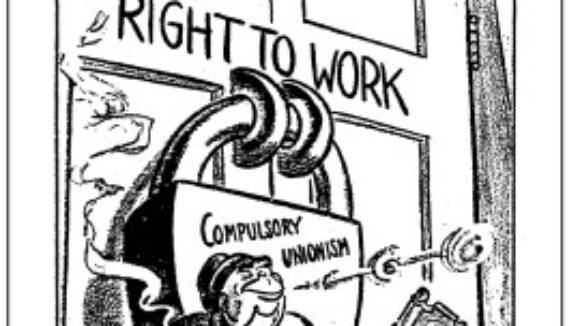Video: SEIU's Stephen Lerner's trying to create chaos in America
Forced-dues funding radical left extremists. …
Forced-dues funding radical left extremists. …

But National Forced-Dues Repeal Measure Still Being Held Back (Source: September 2011 NRTWC Newsletter) Not long ago, Big Labor was crowing about having thwarted citizen efforts to pass new Right to Work laws in Indiana and New Hampshire this year. But it's now clear that the boasts of the union bosses were premature. Legislative support for abolishing compulsory union membership, dues and fees has been and remains strong in both the Hoosier and Granite States. Union lobbyists have therefore had to rely heavily on Gov. Mitch Daniels (R-Ind.) and union-label Gov. John Lynch (D-N.H.) to prevent enactment of America's 23rd and 24th state Right to Work laws. But now Mr. Daniels, under increasing heat from thousands and thousands of freedom-loving Hoosiers, including many who have supported him in the past, is signaling that he may reconsider his opposition to legislative votes on Right to Work measures in Indianapolis next year. Meanwhile, Mr. Lynch's late-spring veto of H.B.474, which would prohibit the firing of New Hampshire employees for refusal to pay dues or fees to an unwanted union, may now potentially be overridden because of a sustained Right to Work lobbying campaign. States Can't Afford to Ignore Fact That Compulsory Unionism Hinders Economic Growth "In the two years since the severe 2008-9 national recession officially ended, most state economies have recovered only feebly, if at all," commented National Right to Work Committee President Mark Mix. "That's why many Indianans and New Hampshirites, along with the citizens of a number of other states that have yet to enact Right to Work laws, are now emphatically telling their elected officials that they can't afford to ignore the fact that compulsory unionism hinders economic growth. "Trends in employee compensation, that is, wages, salaries, bonuses and benefits, illustrate well the Right to Work growth advantage. "From 2000 to 2010, the inflation-adjusted outlays of private-sector businesses for employee compensation increased by an average of 11.8% in Right to Work states. That increase is nine times as great as forced-unionism states' combined 1.3% rise over the same period. "Twenty of the 22 Right to Work states experienced a real compensation increase greater than the national average of 4.9%. And 14 of the 15 states with the lowest real compensation growth lack a Right to Work law." Mr. Mix added that faster growth constitutes only a part of Right to Work states' edge. Adjusting for regional differences in living costs with the help of indices created by the non-partisan Missouri Economic Research and Information Center (MERIC), in 2010 the average compensation per private-sector employee in Right to Work states was $56,830. That's roughly $1100 more than the average for forced-unionism states. Cost of Living-Adjusted Compensation Higher In Right to Work States

California’s legislative session is coming down to its final days and Big Labor is looking for another industry to foist its forced-unionization scheme upon. Believe it or not they are targeting the Golden State’s babysitters. The LA Times notes: As this…

California’s legislative session is coming down to its final days and Big Labor is looking for another industry to foist its forced-unionization scheme upon. Believe it or not they are targeting the Golden State’s babysitters. The LA Times notes: As this…
[stream provider=youtube flv=w4TkzWcGTxo img=x:/nrtwc.org/wp-content/uploads/2011/08/TerryMoeCEAFU.png embed=false share=false width=580 height=280 dock=true controlbar=over bandwidth=high autostart=false /] Dr. Moe: As long as monopolistic teacher unions "remain powerful," effective schools "will be short-changed." Stanford Professor Lambastes Monopolistic Teacher Unionism (Source: July 2011 NRTWC Newsletter) On June 1, Tennessee achieved a legislative milestone when its elected officials effectively repealed a 33-year-old state statute authorizing and promoting union monopoly-bargaining control over teachers and other K-12 public school instructional employees. Under the new K-12 reform law approved by the Legislature and signed by Gov. Bill Haslam (R ), no union or other organization will be handed a legally protected monopoly over all "employee" input in discussions with school boards over working conditions. Once this law, known as the Collaborative Conferencing Act, takes effect, teachers who choose not to join any union will, for the first time in decades, have a voice in discussions throughout Tennessee regarding salaries, benefits and grievances. Tennessee revoked teacher union bosses' monopoly-bargaining privileges last month largely thanks to persistent lobbying by the roughly 46,000 National Right to Work Committee members and supporters in the Volunteer State. And, according to Stanford University political scientist and education specialist Terry Moe, the Tennesseans who helped pass the Collaborative Conferencing Act have done an enormous favor for their state's schoolchildren. From Children's Standpoint, Union Boss-Perpetuated Salary Rules 'Make No Sense at All' In his new book Special Interest: Teachers Unions and America's Public Schools (Brookings Institution Press), Dr. Moe documents how teacher union monopoly bargaining, still statutorily enshrined in more than 30 states, impairs school outcomes while sharply raising the cost to taxpayers. In practice, charges Dr. Moe, "exclusive" union bargaining routinely produces "key decisions that depart from -- and are systematically biased against -- what is best for kids and effective organization." One example among many are so-called "single salary schedules" that furnish teachers with extra pay for additional degrees and course taking, even though "research has consistently shown" that simply accumulating degrees and/or additional course credits, "does not make teachers more effective." From "the standpoint of what is best for children," such Big Labor-perpetuated salary rules "make no sense at all" (emphasis Dr. Moe's). But teacher union officials ferociously defend "single salary schedule" rules, because they keep educators dependent on the union for securing better pay and career advancement. Monopolistic Unionism Can Never Be 'Reform Unionism' In today's America, Special Interest goes on to point out, many education policymakers and other leaders "recognize that teacher unions are standing in the way of effective schools," but mistakenly believe that union officials "can be persuaded to do good things with their [monopolistic] power." This is the false hope of what is commonly called "reform unionism."
[stream provider=youtube flv=w4TkzWcGTxo img=x:/nrtwc.org/wp-content/uploads/2011/08/TerryMoeCEAFU.png embed=false share=false width=580 height=280 dock=true controlbar=over bandwidth=high autostart=false /] Dr. Moe: As long as monopolistic teacher unions "remain powerful," effective schools "will be short-changed." Stanford Professor Lambastes Monopolistic Teacher Unionism (Source: July 2011 NRTWC Newsletter) On June 1, Tennessee achieved a legislative milestone when its elected officials effectively repealed a 33-year-old state statute authorizing and promoting union monopoly-bargaining control over teachers and other K-12 public school instructional employees. Under the new K-12 reform law approved by the Legislature and signed by Gov. Bill Haslam (R ), no union or other organization will be handed a legally protected monopoly over all "employee" input in discussions with school boards over working conditions. Once this law, known as the Collaborative Conferencing Act, takes effect, teachers who choose not to join any union will, for the first time in decades, have a voice in discussions throughout Tennessee regarding salaries, benefits and grievances. Tennessee revoked teacher union bosses' monopoly-bargaining privileges last month largely thanks to persistent lobbying by the roughly 46,000 National Right to Work Committee members and supporters in the Volunteer State. And, according to Stanford University political scientist and education specialist Terry Moe, the Tennesseans who helped pass the Collaborative Conferencing Act have done an enormous favor for their state's schoolchildren. From Children's Standpoint, Union Boss-Perpetuated Salary Rules 'Make No Sense at All' In his new book Special Interest: Teachers Unions and America's Public Schools (Brookings Institution Press), Dr. Moe documents how teacher union monopoly bargaining, still statutorily enshrined in more than 30 states, impairs school outcomes while sharply raising the cost to taxpayers. In practice, charges Dr. Moe, "exclusive" union bargaining routinely produces "key decisions that depart from -- and are systematically biased against -- what is best for kids and effective organization." One example among many are so-called "single salary schedules" that furnish teachers with extra pay for additional degrees and course taking, even though "research has consistently shown" that simply accumulating degrees and/or additional course credits, "does not make teachers more effective." From "the standpoint of what is best for children," such Big Labor-perpetuated salary rules "make no sense at all" (emphasis Dr. Moe's). But teacher union officials ferociously defend "single salary schedule" rules, because they keep educators dependent on the union for securing better pay and career advancement. Monopolistic Unionism Can Never Be 'Reform Unionism' In today's America, Special Interest goes on to point out, many education policymakers and other leaders "recognize that teacher unions are standing in the way of effective schools," but mistakenly believe that union officials "can be persuaded to do good things with their [monopolistic] power." This is the false hope of what is commonly called "reform unionism."
Gov. Tim Pawlenty’s support for Right to Work ignited long and enthusiastic rounds of applause from the New Hampshire audience. [stream provider=youtube flv=http%3A//www.youtube.com/watch%3Fv%3DKFB3EdI-v6M img=x:/img.youtube.com/vi/KFB3EdI-v6M/0.jpg embed=false share=false width=580 height=360 dock=true controlbar=over bandwidth=high autostart=false /] The state came…
Gov. Tim Pawlenty’s support for Right to Work ignited long and enthusiastic rounds of applause from the New Hampshire audience. [stream provider=youtube flv=http%3A//www.youtube.com/watch%3Fv%3DKFB3EdI-v6M img=x:/img.youtube.com/vi/KFB3EdI-v6M/0.jpg embed=false share=false width=580 height=360 dock=true controlbar=over bandwidth=high autostart=false /] The state came…
From the The National Right To Work Legal Defense press release (6/2/2011): National Right to Work Foundation attorneys helping workers and former Machinist union president challenge attempt to send jobs to Washington Washington, DC (June 2, 2011) – With free legal assistance from the National Right to Work Foundation, a group of Charleston-area Boeing Corporation employees are asking to intervene in the National Labor Relations Board’s (NLRB) unprecedented case targeting Boeing for locating production in South Carolina in part due to its popular Right to Work law. That law ensures that union dues and membership are strictly voluntary. The NLRB’s complaint, if successful, would eliminate over 1,000 existing jobs in South Carolina, not to mention several thousand more jobs that would be created once the Boeing plant reaches full production capacity. Further, the case could set a dangerous precedent that allows union bosses to dictate where job providers locate their facilities.